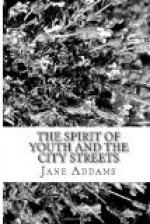“I know the judge thinks I am a bad girl,” sobbed a poor little prisoner, put under bonds for threatening to kill her lover, “but I have only been bad for one week and before that I was good for six years. I worked every day in Blank’s factory and took home all my wages to keep the kids in school. I met this fellow in a dance hall. I just had to go to dances sometimes after pushing down the lever of my machine with my right foot and using both my arms feeding it for ten hours a day—nobody knows how I felt some nights. I agreed to go away with this man for a week but when I was ready to go home he tried to drive me out on the street to earn money for him and, of course, I threatened to kill him—any decent girl would,” she concluded, as unconscious of the irony of the reflection as she was of the connection between her lurid week and her monotonous years.
Knowing as educators do that thousands of the city youth will enter factory life at an age as early as the state law will permit; instructed as the modern teacher is as to youth’s requirements for a normal mental and muscular development, it is hard to understand the apathy in regard to youth’s inevitable experience in modern industry. Are the educators, like the rest of us, so caught in admiration of the astonishing achievements of modern industry that they forget the children themselves?
A Scotch educator who recently visited America considered it very strange that with a remarkable industrial development all about us, affording such amazing educational opportunities, our schools should continually cling to a past which did not fit the American temperament, was not adapted to our needs, and made no vigorous pull upon our faculties. He concluded that our educators, overwhelmed by the size and vigor of American industry, were too timid to seize upon the industrial situation, and to extract its enormous educational value. He lamented that this lack of courage and initiative failed not only to fit the child for an intelligent and conscious participation in industrial life, but that it was reflected in the industrial development itself; that industry had fallen back into old habits, and repeated traditional mistakes until American cities exhibited stupendous extensions of the medievalisms in the traditional Ghetto, and of the hideousness in the Black Country of Lancashire.
He contended that this condition is the inevitable result of separating education from contemporary life. Education becomes unreal and far fetched, while industry becomes ruthless and materialistic. In spite of the severity of the indictment, one much more severe and well deserved might have been brought against us. He might have accused us not only of wasting, but of misusing and of trampling under foot the first tender instincts and impulses which are the source of all charm and beauty and art, because we fail to realize that by premature factory work, for which the youth is unprepared, society perpetually extinguishes that variety and promise, that bloom of life, which is the unique possession of the young. He might have told us that our cities would continue to be traditionally cramped and dreary until we comprehend that youth alone has the power to bring to reality the vision of the “Coming City of Mankind, full of life, full of the spirit of creation.”




